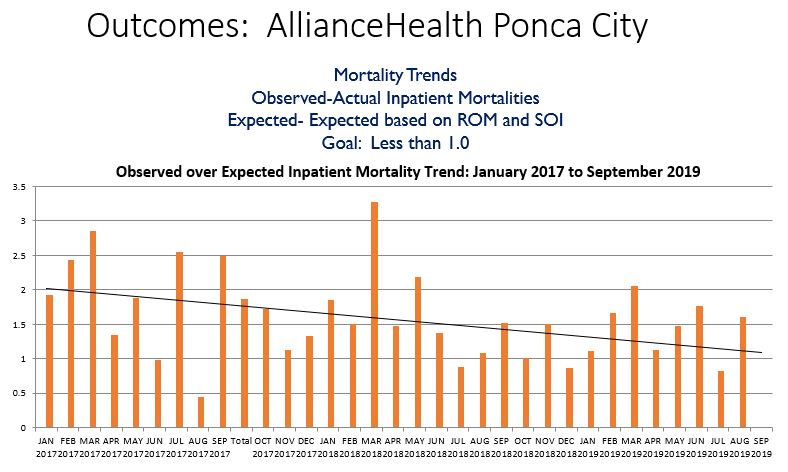Spotlight on AllianceHealth Ponca City’s Mortality Reduction Project
Posted on: 1/10/20
Each of the Excellence in Quality Award submissions will be featured in this column over the coming weeks to highlight and share successful quality initiatives. For each submission, we will describe how the problem was identified, the improvement goal(s), interventions and outcomes. Please feel free to utilize this information, duplicate interventions, and share with your staff.
AllianceHealth Ponca City received an Honorable Mention for submission of their Mortality Reduction Project, submitted by
Carla Hobbs, MT (ASCP), chief quality, quality management and regulatory compliance.
Identifying the Problem: Mortality rates and observed-over-expected rates were higher than national averages and higher than peers in the geographic region.
The Goal: Reduce hospital mortality to less than 1.0 observed/expected.
Intervention: A multi-disciplinary Mortality Reduction Team was formed to develop and test initiatives to impact outcomes. The actions of this team included:
- Performed chart audits;
- Reviewed medications;
- Implemented a new electronic query process and provided monthly documentation education to providers;
- Reviewed documentation for complications and comorbidities;
- Improved the sputum collection process;
- Customized the EHR for nursing screens, nutrition assessments and provider order sets;
- Established swallow testing and education staff on procedure;
- Monitored and maintained improvement process.
The Outcome:

- Overall mortality (observed over expected) rate improvement from an average of 1.54 in 2018 to a TYD average of 1.20 in 2019, an improvement of 16%.
- Antibiotics initiative in the ED for admitted inpatients improved to 89% in July 2019.
- Incentive spirometer usage improved by 80% from Q3 2018 to Q3 2019.
- Adequate specimen collections for sputum culture improved by 63%.
- 100% of new providers go through an orientation process addressing adherence to protocols, processes and documentation.
Comments: The impact of creating a multi-disciplinary team impacting several processes within the hospital system is evident in the outcomes of this initiative. The Mortality Reduction Team included the chief quality officer, nursing risk manager, clinical documentation specialist, physician advisor and case manager. A pharmacist conducted medication review; the respiratory therapy director and lab supervisor were involved in the sputum collection process; clinical IT assisted with the EHR customization and an inpatient coder reviewed documentation for complications and comorbidities; a physician advisor attended all meetings and case reviews and assisted with medical staff education.
The process of improving quality and patient safety requires a team, it is
not the responsibility of one person!
(Patrice Greenawalt)